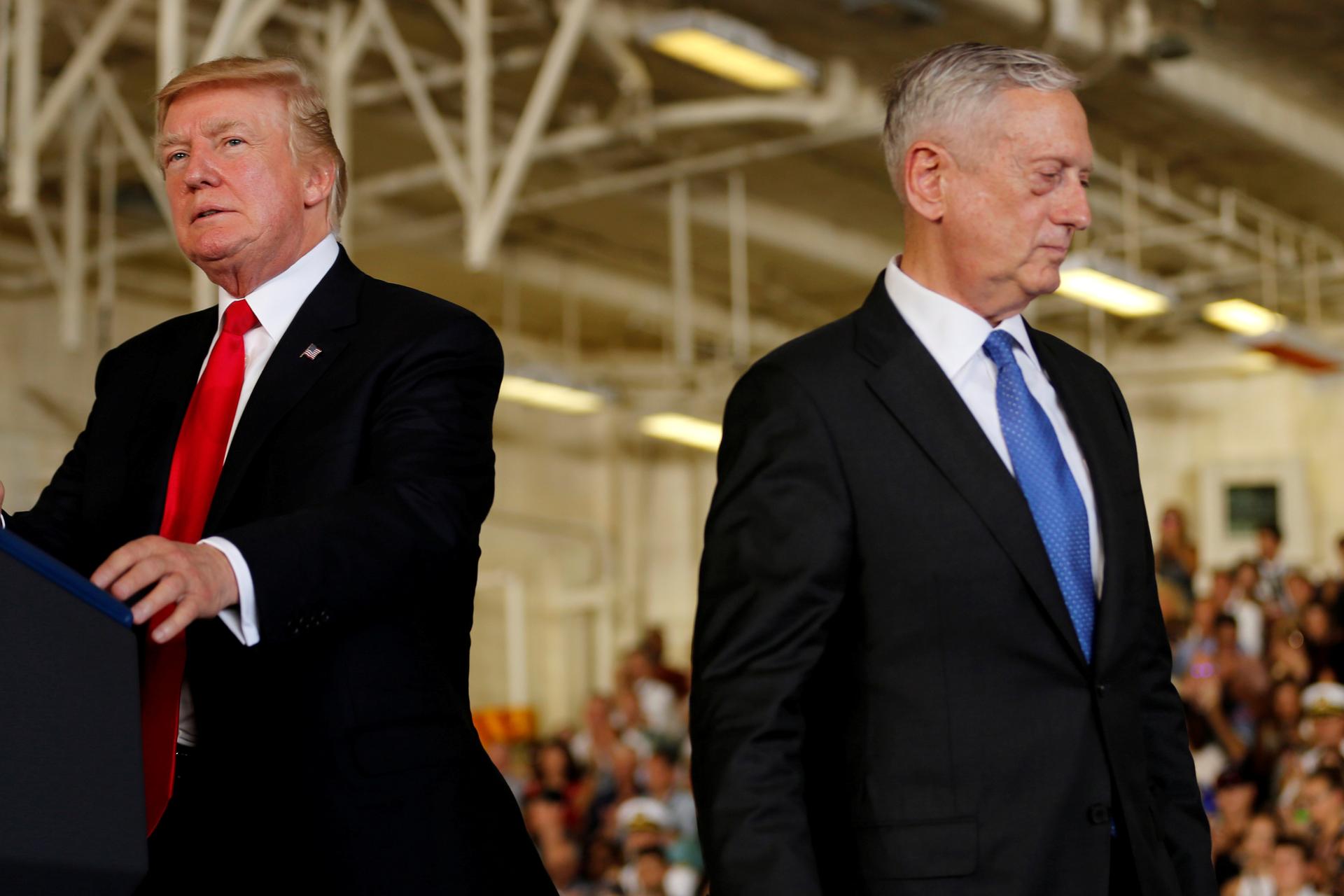Watch: President Trump discusses his new plan for Afghanistan conflict
US President Donald Trump is introduced by Defense Secretary James Mattis, right, during the commissioning ceremony of the aircraft carrier USS Gerald R. Ford on July 22, 2017. Trump will address the nation Monday to reveal a new plan for the Afghan war.
President Donald Trump was poised to unveil his strategy for Afghanistan on Monday, putting his mark on America's longest war in his first formal address to the nation since becoming commander-in-chief.
Having repeatedly pledged to withdraw US troops from Afghanistan after 16 frustrating years of conflict, Trump looks set to ease his opposition and heed calls from his top generals for the United States to stay the course in his evening speech.
What began in October 2001 as a hunt for those responsible for the 9/11 attacks has turned into an effort to keep Afghanistan's divided and corruption-hindered democracy alive.
Thousands of US troops have died battling insurgents, and the war has cost US taxpayers trillions of dollars.
Victory against Taliban — and now ISIS — militants remains far from certain, despite that high cost.
"The Afghan government remains divided and weak, its security forces will take years of expensive US and allied support to become fully effective, and they may still lose even with such support," said Anthony Cordesman of The Center for Strategic and International Studies.
Trump has been wary of international involvements, but is eager to show success and steel in the realm of national security.
Like his predecessor Barack Obama, he has taken months to decide between an array of difficult choices in Afghanistan.
The administration had originally promised a new plan by mid-July, but Trump was said to be dissatisfied by initial proposals to deploy a few thousand more troops.
His advisors went back to the drawing board, examining an expanded strategy for the broader South Asian region, including Pakistan — which holds some influence over the Taliban.
The options are said to include an increase in troop numbers — something on the order of about 4,000.
There are currently about 8,400 US and 5,000 NATO troops supporting Afghanistan's security forces in the fight, but the situation has remained as deadly as ever.
More than 2,500 Afghan police and troops have been killed already this year.
On Friday, Trump gathered generals and top aides at the bucolic presidential retreat in Camp David, Maryland, saying afterward that "many decisions" had been made.
oembed://https%3A//www.youtube.com/watch%3Fv%3D2FV-E-u6-Cs
Decision after 'rigorous' debate
Trump will unveil his decision at 9:00 p.m. ET in an address to the nation delivered in front of US troops at Fort Myer, located just over the Potomac River in Arlington, Virginia.
The US leader will "provide an update on the path forward for America's engagement in Afghanistan and South Asia," the White House said in a statement.
The announcement comes amid a month of serious turmoil for his administration, which has seen several top White House officials fired and revelations that members of Trump's campaign are being investigated by a federal grand jury.
The decision on Afghanistan could have wide-ranging political repercussions for Trump, who faces a backlash from his base if he reverses a major campaign pledge and deepens US involvement.
One of the main voices arguing for withdrawal, Trump's nationalistic chief strategist Steve Bannon, was removed from his post on Friday.
Among the advisors who were present was new White House chief of staff John Kelly, a former Marine Corps general whose son died in Afghanistan in 2010.
Doubling down on the existing strategy will also signify the moment that Trump takes responsibility for the success or failures that come with it.
And Americans will be looking closely at the tenor of his address. Controversial off-the-cuff remarks and statements strewn with falsehoods have become a hallmark of Trump's presidency.
But many will be looking for evidence that a president who has shown little interest in policy has sufficiently pondered any decision to send more young Americans into mortal danger.
Trump's Defense Secretary Jim Mattis confirmed in Amman, Jordan on Sunday that the administration had agreed on a new strategy for Afghanistan after "rigorous" debate, but refused to provide any details about the decision.
"I'm very comfortable that the strategic process was sufficiently rigorous, and did not go in with a pre-set condition in terms of what questions could be asked and what decisions could be made," Mattis said.
"Everyone who had equity was heard," he said, including budget officials responsible for funding the effort.
The US president, fresh from a working vacation at his New Jersey resort, returned to the US capital late Sunday, and took a swipe at one of his customary Twitter targets — the news media.
"Heading back to Washington after working hard and watching some of the worst and most dishonest Fake News reporting I have ever seen!" he wrote.
